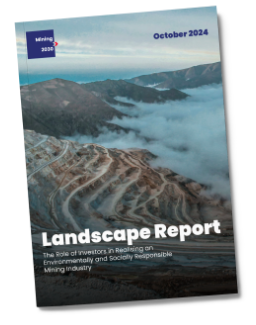
Credit: Chronos Sustainability
Ahead of the company's sponsorship of the UK Green Business Awards, Chronos Sustainability's CEO Dr. Rory Sullivan explains why systemic change requires collaboration that is aligned, ambitious and directed towards action
From climate change to deforestation, nature loss to ocean acidification, the environmental challenges we face are complex and cannot be solved by one company, one industry, or one government acting alone.
To build a truly green economy we must redesign policy and market systems to better incentivise sustainable investment and green business. This requires actors from all parts of the value chain - including investors, companies, policymakers, consumers and civil society to collaborate. But bringing actors together to collaborate is only part of the solution. If these collaborations are really to deliver systemic change they need to be aligned in their goals, they need to be ambitious and they need to be directed towards action.
What do we mean by 'systemic change'?
Creating greener and more sustainable economic systems requires changes at scales in how we produce, distribute and consume products and services. What might this look like in practice?
Let's take food as an example. If we want to create a climate-positive food system then retailers need to fully understand the carbon footprint of all their products, and then promote those products with the lowest carbon footprint. Clearly, they can't do this on their own. They need suppliers who can provide these products, and lower carbon versions of existing products. They need data and information from across the supply and value chain. They need policymakers to make the low carbon transition of agriculture a central goal of public policy through, for example, reducing and ultimately ending subsidies to emissions-intensive agriculture. They need their investors to be supportive of the low carbon transition and to reward and recognise those companies that make the greatest efforts in pursuit of that goal. They need consumers to support this shift with their shopping decisions. Put simply, effective solutions for a sustainable food system therefore need to involve a wide range of actors, all pulling in the same direction with aligned ambitions and action plans.
Green investment requires similarly systemic thinking. It is relatively easy for an individual investor to divest from emission-intensive stocks such as oil and gas or aviation companies and claim it has a ‘green portfolio'. However, without other changes, the reality is that any shares sold by that investor will simply be bought by other players in the market and the total amount of emissions being released to the atmosphere will be unaffected. Real-world impact requires policy measures that encourage emissions reductions across the economy, consumers to change the way in which they travel (e.g. from air to rail, from car to bike), and investors to use their influence with these companies to encourage low carbon innovation and the development of energy efficiency solutions.
Alignment, Ambition and Action
Ultimately, changing sectors like food, energy and transport needs partnerships that are hardwired to be effective. That means ensuring all parties are aligned, have the right level of ambition, and are able to act.
Alignment is important to ensure there is common purpose internally and consistent objectives and messaging externally. A failure to align inevitably leads to fragmentation, lack of clarity and confusion.
Ambition is important to ensure that the goals and outcomes being sought are relevant. While high ambition goals are not always achieved, it is a truism to say that low ambition initiatives inevitably deliver unambitious and disappointing outcomes. Of course, partnerships and collaborations can deliver other benefits such as capacity-building and improved relationships between stakeholders, the ultimate test is what outcomes are delivered through these partnerships and collaborations.
Action is important to delivery. There is limited value in well-intentioned and high-minded initiatives that do not have delivery at their heart. Action is also important because it maintains momentum and keeps stakeholders engaged.
That's why at Chronos we have a key focus on impact-led collaborations. These are partnerships that convene actors, build understanding, negotiate to find alignments of interest, define ambitious goals and establish and implement practical action plans on the way forward.

Collaborating to build the mining industry of the future
A good example of this is our work with the Global Investor Commission on Mining 2030. The initiative was created to focus on the role of mining in the low carbon transition, given that we need more mining to extract the critical minerals (such as lithium and rare earth minerals) needed in green products from batteries to solar panels, but also more responsible mining in order to reduce the sector's negative environmental impacts.
The initiative has aligned around a clear ambition: To define investor expectations for the mining industry on issues such as air and water pollution and biodiversity loss. This clear path – set out in its comprehensive Landscape Report, which Chronos helped produce last year - has helped the group attract backing from investors managing over $16tr in assets. The Mining 2030 Commission is now developing action plans and proposals emerging for investors and mining companies that will drive higher environmental and social standards across the industry and that will build the institutional architecture (standards, governance processes, accountability mechanisms) and political support that will turn the initiative's recommendations into concrete action.
Using data and benchmarks to drive systemic change
One of the most effective tools we employ to deliver multi-stakeholder solutions is the use of industry-wide benchmarks on good practice. The Business Benchmark on Farm Animal Welfare (BBFAW) is a great example of this. BBFAW's ambition is to drive significant improvements in how major global food companies manage farm animal welfare in their own operations and in their supply chains. The BBFAW benchmark tracks company practice and performance on issues such as close confinement and humane methods of slaughter, with these data reported annually on a company-by-company basis. The benchmark creates alignment by defining what good looks like, with all the actors involved - investors, companies and consumers alike – recognising that improvements in the benchmark represent substantial improvements in company practice and performance.
BBFAW's wider work includes direct company engagement, convening a multi-trillion dollar coalition of investors concerned about farm animal welfare, and engaging with policymakers to encourage action on issues such close confinement. This work has been demonstrably effective. BBFAW has helped triple the proportion - from 26 per cent to 79 per cent over the last decade - of food companies in the benchmark setting animal welfare improvement targets.
Going far, together
When it comes to solving complex sustainability challenges there is a much truth in the old African proverb: 'If you want to go fast, go alone; if you want to go far, go together.' But going together is only part of the picture. To deliver real change you need key actors (public and private sector, companies and the value chain, investors, consumers) to be aligned on the direction of travel. You need to have a clear and ambitious vision of where you want to get to. And then you must take the actions needed to get there.
Dr. Rory Sullivan is CEO at Chronos Sustainability.
Chronos Sustainability is a sponsor of the UK Green Business Awards 2025, which will take place on the evening of 11 June at The Brewery in London. You can reserve your place at the awards here.








